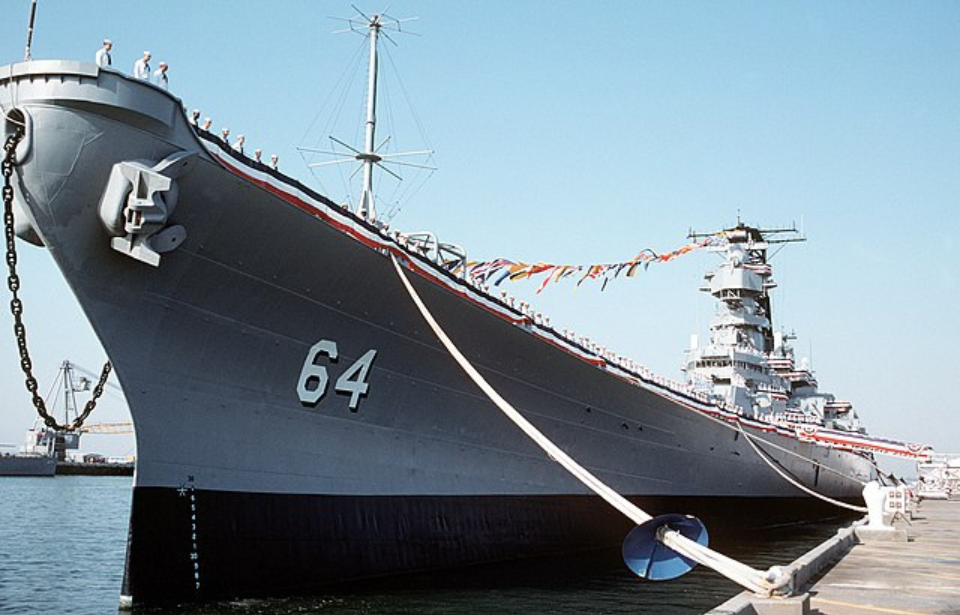The USS Wisconsin (BB-64) was an Iowa-class vessel that served with the US Navy on and off from 1944-91. She was the second-last of her class to be commissioned, and one of the last battleships ever constructed by the United States. Experiencing action during World War II, the Korean War and the Gulf War, “Wisky” earned six battle stars and a Navy Unit Commendation.
Construction of the USS Wisconsin (BB-64)
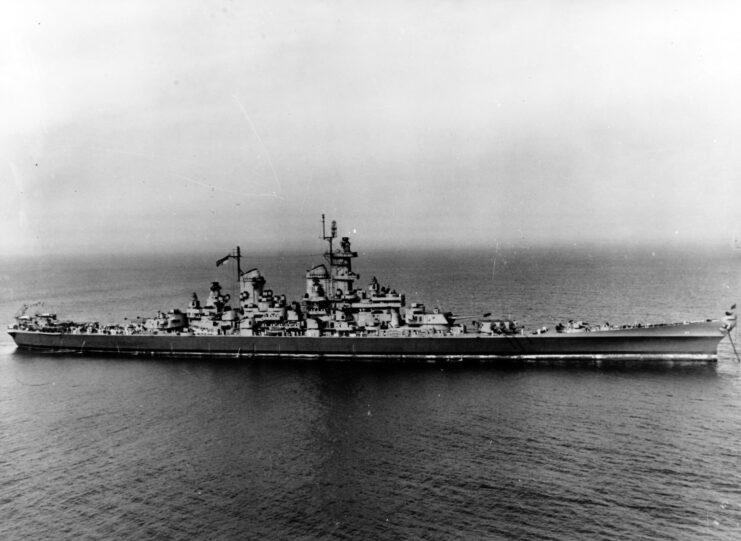
The initial plans for the USS Wisconsin were developed in 1938 by the Preliminary Design Branch of the Bureau of Construction and Repair. Laid down on January 25, 1941 at the Philadelphia Navy Yard, she was the third of four Iowa-class “fast” battleships.
On December 7, 1943, Wisconsin was launched, and she was commissioned the following year. After initial testing in Chesapeake Bay, the vessel left Norfolk, Virginia for her shakedown cruise in the British West Indies. Following this, she sailed via the Panama Canal to the Pacific.
USS Wisconsin (BB-64) specs
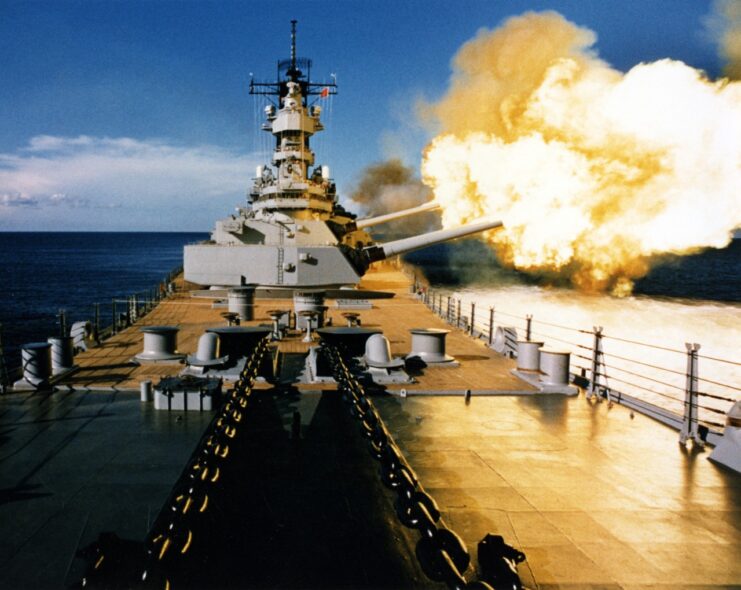
The USS Wisconsin‘s main armament included nine 16-inch/50 cal. Mk 7 guns in three turrets, which could fire 2,700-pound armor-piercing shells up to 20 miles. In addition to this, she was equipped with twenty 5-inch/38 cal. guns in 10 turrets, forty-nine Oerlikon 20 mm cannons and eighty Bofors 40 mm anti-aircraft guns.
During the 1980s, Wisconsin had her anti-aircraft guns replaced with Phalanx CIWS mounts. She also had her five-inch/38 cal. gun total reduced to 12, and received armored box launchers, which fired Tomahawk missiles, and quad cell launchers capable of firing Harpoon missiles.
Wisconsin and the USS Missouri (BB-63) had 14.5-inch-thick bulkheads, compared to their sister ships, the USS Iowa (BB-61) and New Jersey (BB-62), which only had 11.3-inch bulkheads. The rest of Wisconsin’s armor, however, was identical to the other Iowa battleships.
Wisconsin, like her sister ships, also carried floatplanes during the Second World War. Early on in the Cold War, a helicopter pad was positioned at the stern. Toward the end of their service life, each ship in the class could carry up to five unmanned aerial vehicles (UAVs).
Making waves in the Pacific during World War II
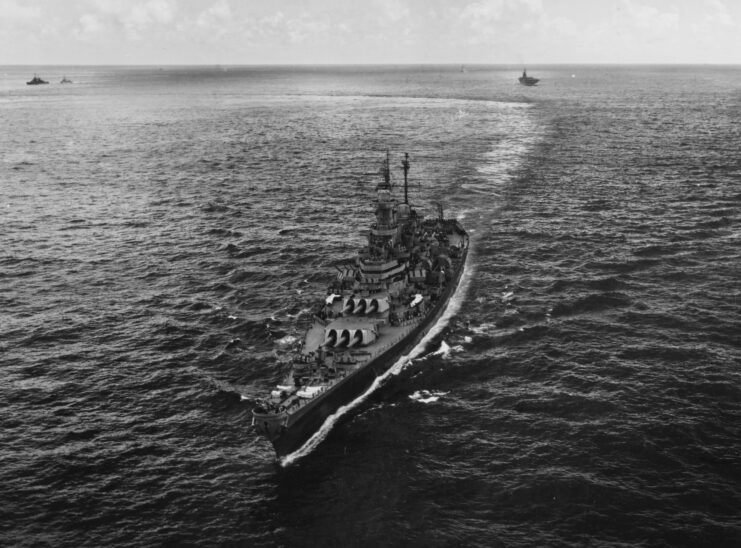
After departing the West Coast for Hawaii and the Caroline Islands, the USS Wisconsin joined Adm. William Halsey‘s Third Fleet on December 9, 1944. While she’d missed out on most of the Second World War, the battleship saw combat shortly after joining the conflict.
In preparation for the US invasion of Mindoro, Wisconsin joined the Fast Carrier Task Force (TF-38), charged with softening Japanese defenses ahead of American ground forces. During her first operation, the task force came up against Typhoon Cobra. Three destroyers sank, a number of ships were damaged and hundreds of sailors were either killed, missing or injured. Somehow, Wisconsin got out unscathed, reporting just two injured crewmen.
Wisconsin went on to help in the occupation of Luzon, acting as a carrier escort and protecting the vessels from air attacks. In February 1945, she joined the Fifth Fleet’s Task Force 58 (TF-58), pushing north toward Japan. During this time, the battleship provided support and assisted in the landing of troops on Iwo Jima. She also engaged shore-based targets on Hachinohe, Okinawa and Tokyo.
Wisconsin was caught in another typhoon on June 4, once again riding out the storm completely untouched. On September 5, she sailed into Tokyo Bay, just three days after the formal surrender had been signed aboard her sister ship, the USS Missouri.
Over the course of her short service during the Second World War, Wisconsin sailed 105,831 nautical miles. With the conflict over, she took part in Operation Magic Carpet, after which she was put into the Atlantic Reserve Fleet and made inactive.
‘TEMPER TEMPER’
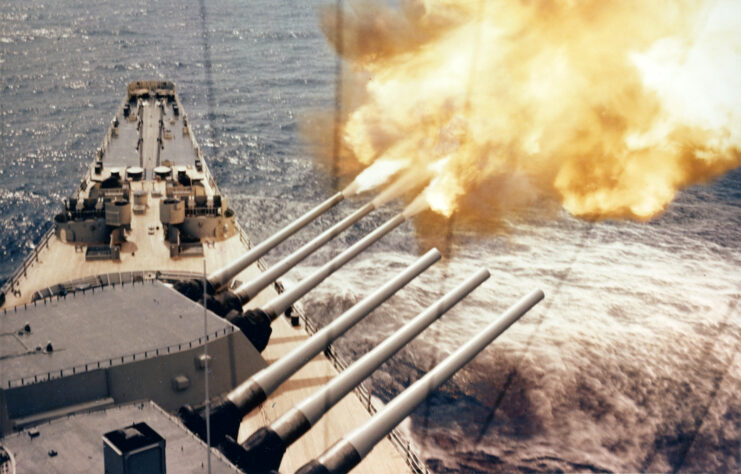
At the start of the Korean War, the USS Wisconsin was recommissioned. After a shakedown and two midshipmen training cruises, she departed Norfolk on October 25, 1951 for the Pacific.
Once again traveling via the Panama Canal, Wisconsin arrived in Japan on November 21 and relieved the USS New Jersey as Vice Adm. H.M. Martin’s flagship for the Seventh Fleet. Five days later, she departed for Korea, in support of Task Force 77 (TF-77), and tasked with shore bombardment.
On March 15, 1952, while shelling enemy positions at Songjin, Wisconsin lost her temper. Coming in close to shore, North Korean forces fired back at the vessel, their 155 mm shells hitting her, but causing no damage. Only three sailors were injured. In retaliation, Wisconsin aimed her guns at the enemy position and fired the most impressive broadside, completely obliterating the North Korean artillery. With a quick wit, the USS Buck (DD-761), her escort, signaled, “TEMPER TEMPER.”
While there isn’t a lot of evidence for this incident, it’s still a great story.
The USS Wisconsin (BB-64) returns to the United States
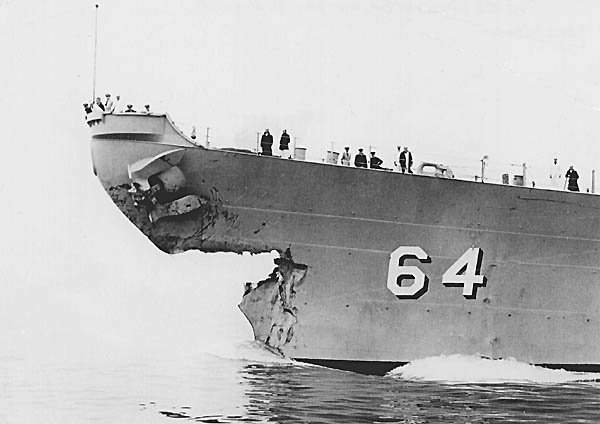
On April 1, 1952, the USS Wisconsin was relieved by the USS Iowa. Following the Korean War, she acted as a training ship and flagship, and took part in various exercises.
On May 6, 1956, Wisconsin collided with the USS Eaton (DD-510) in heavy fog. With extensive damage to her bow section, the battleship sailed to Norfolk Naval Shipyard for repairs. The replacement bow was taken from the incomplete USS Kentucky (BB-66) and installed onto Wisconsin in only a matter of days.
On June 28, Wisconsin was ready to return to sea, but didn’t do so until March 8, 1958, when she, again, joined the US Navy’s Reserve Fleet.
Gulf War
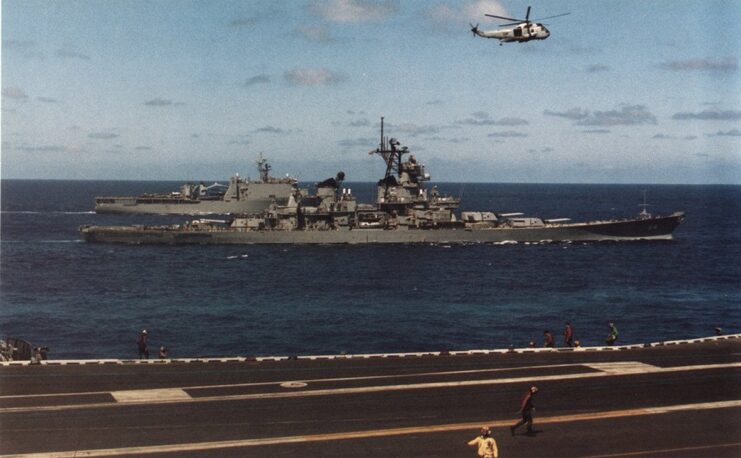
On August 1, 1986, the Wisconsin was reactivated as part of President Ronald Reagan and Navy Secretary John F. Lehman’s attempt to create a “600-ship Navy.” During the late ’80s, she underwent modernization and was recommissioned.
Following the Iraqi invasion of Kuwait, US naval forces were deployed as part of Operation Desert Shield. When Operation Desert Storm began, Wisconsin and the USS Missouri launched Tomahawk strikes against Iraq. They were some of the first ships to use cruise missiles during the Gulf War, with Wisconsin serving as the Tomahawk Land Attack Missile (TLAM) strike commander. The conflict also saw the battleship, for the first time since 1952, provide gunfire support.
More from us: USS Harder (SS-257): The WWII-Era Submarine That Took Out Five Enemy Destroyer In Four Days
Over the course of the war, both Wisconsin and Missouri fired more than one million pounds of ordnance on Iraqi targets. With the end of the conflict, all four Iowa-class battleships were decommissioned.
